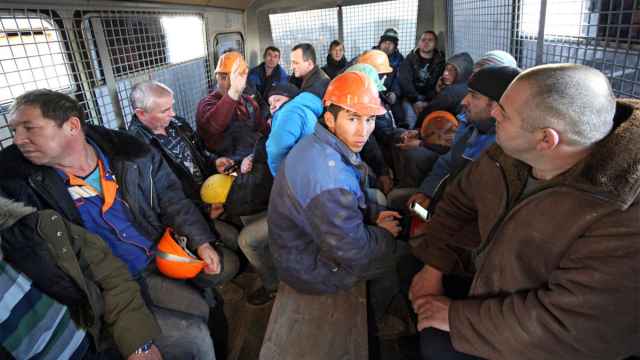Халатность: negligence
Among the many words used to describe the horror in Kemerovo, a couple words keep coming up: халатность (negligence) and разгильдяйство (sloppiness). These are, sadly, what Russian commentators, philosophers, literary figures and philologists call key concepts of Russian life and culture. Both of them have fascinating histories, but one of them — разгильдяйство — gives translators a headache.
Let’s begin with халатность (negligence). Armchair etymologists look at the word and suggest that it is derived from the noun халат (a robe). And in this case, to my amazement, armchair etymologists are absolutely right.
The adjective халатный (literally something like “robe-like”) began to be used in a new way in the 1830s and 40s. The халат, what the nobility and owners of small estates and manor houses lounged in all day, became a symbol of laziness. Seminarians and small-scale merchants also began to wear their халаты all day under their dress coats. This outraged writers like the conservative Ivan Aksakov, who shouted from the pages of a letter to a newspaper editor: халат — это эмблема лени, бесцеремонности! (The robe is the emblem of laziness and informality!).
At first халатный was a strange-sounding neologism, but after the writer Nikolai Gogol used it to describe the lazy, careless qualities of the men lounging in them, by the 1840s and 50s it began to lose its strangeness. At that point the noun халатность appeared.
Of course, language purists hated the word and condemned its new usage, much the way language purists today complain about any new words. One brochure called Неправильности в современном разговорном, письменном и книжном русском языке (Incorrect Usage in Contemporary Spoken, Written and Literary Russian Language) railed against халатность as неприличное слово (obscene word) that should never be used in a figurative sense.
But the purists lost the battle (as they almost always do), and халатность became a fixed part of the language. In its extreme form, it’s against the law: Если на начальном этапе мы видели просто халатность родителей, то теперь это переросло в преступную халатность (If in the first stage we simply saw parental carelessness, now it has grown to criminal negligence.)
It also became to be perceived as something particularly Russian. The poet Afanasy Fet wrote in the late 19th century: Нравится нам во французском образе все то, что составляет дурные его стороны, именно распущенность его, халатность, ― это больше всего усваивает себе русский человек (We like everything that makes up the unsavory aspect of the French manner, specifically loose conduct and negligence — that’s mostly what a Russian adopts.)
A few years later another writer, Alexander Kuprin, would assert that all Russia’s problems were caused by наша общая халатность и беспорядок (our universal negligent attitude and lack of order.) But maybe it’s not just a Russian thing: Человеку же свойственны две вещи: забывчивость и халатность (Human beings have two characteristics: they are forgetful and careless.)
Now think about the word negligence and related words like neglect, neglectful, and ... how about negligée, a women’s form of robe? Is there a parallel between халат / халатность and negligée / negligence? Yes — although the connection goes the other way, so to speak. Халат gave us халатность, but negligence, originally from the Latin neglegere (to disregard, to do nothing about, to fail to care for) gave us negligée (the past participle of négliger “to disregard, neglect, treat carelessly” — “carelessly informal or incomplete clothing”).
That kind of similar etymology is a translator’s dream.
Разгильдяйство is, however, a translator’s nightmare.
First of all, armchair etymology doesn’t work. The word гильдия (guild) seems to be buried in there, making the original meaning of the word something like “a person kicked out of a [merchants’] guild,” which over time came to be the reason for being kicked out — sloppy, careless work.
Lovely, but wrong.
The word’s origin is more likely to be гиль, a Tatar word meaning a mess or confusion. And the original word was probably the person, разгильдяй (slacker, screw-up, sloppy worker), a word formed along the lines of other unsavory characters like лентяй (lazy bum).
Разгильдяй is that annoying co-worker who goofs off and never finishes work on time. And when he does do something, he does a sloppy job, or only half a job, or screws the whole thing up so completely that now there is more work for you to do than if he’d done nothing at all.
At work you try to get these guys to shape up: Начальство приступило к борьбе с разгильдяями ― то есть ребятами, отвыкшими от дисциплины (Management began a campaign against sloppy workers, those guys who weren’t used to discipline.)
The word that describes a разгильдяй is разгильдяйство, miserable to translate because it is an activity, a quality and an attitude all in one. The closest equivalent is perhaps sloppiness, but that might be casual or unintentional, while разгильдяйство indicates a pattern of behavior.
I think the best we can do is a more explanatory translation: Причина и так ясна ― разгильдяйство на всех уровнях (The reason is more than clear — irresponsibility and slovenly work at all levels.)In any case, разгильдяйство is a terrible quality that no one wants to own up to: “Не везет”, “ошибся” произнести проще, чем признаться в глупости и разгильдяйстве. (It’s easier to say “I was unlucky” or “I made a mistake” than to admit to stupidity and irresponsible, careless and poor work.)
And now I hope we will never, ever have to discuss разгильдяйство or халатность again.
Michele A. Berdy is a Moscow-based translator and interpreter, author of “The Russian Word’s Worth,” a collection of her columns. Follow her on Twitter @MicheleBerdy.






